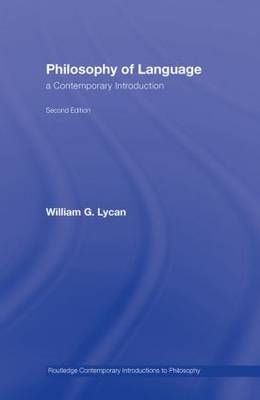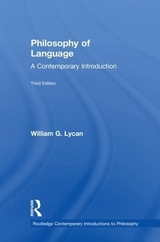
Philosophy of Language
Routledge (Verlag)
978-0-415-95751-9 (ISBN)
- Titel erscheint in neuer Auflage
- Artikel merken
Philosophy of Language: A Contemporary Introduction introduces the student to the main issues and theories in twentieth century philosophy of language, focusing specifically on linguistic phenomena.
Topics are structured in four parts in the book. Part I, Reference and Referring Expressions, includes topics such as Russell's Theory of Desciptions, Donnellan's distinction, problems of anaphora, the description theory of proper names, Searle's cluster theory, and the causal-historical theory. Part II, Theories of Meaning, surveys the competing theories of linguistic meaning and compares their various advantages and liabilities. Part III, Pragmatics and Speech Acts, introduces the basic concepts of linguistic pragmatics, includes a detailed discussion of the problem of indirect force and surveys approaches to metaphor. Part IV, new to this edition, examines the four theories of metaphor.
Features of Philosophy of Language include:
new chapters on Frege and puzzles, inferentialism, illocutionary theories of meaning and relevance theory
chapter overviews and summaries
clear supportive examples
study questions
annotated further reading
glossary.
William G. Lycan is William Rand Kenan Professor of Philosophy at the University of North Carolina. He is the author of over 150 articles as well as seven books.
Contents Preface Acknowledgements Acknowledgements for the Second Edition Chapter 1:Introduction: meaning and reference Overview Meaning and understanding The Referential Theory Summary Questions Notes Further reading PART I:REFERENCE AND REFERRING Chapter 2:Definite descriptions Overview Singular terms Russell's Theory of Descriptions Objections to Russell's theory Donnellan's distinction Anaphora Summary Questions Notes Further reading Chapter 3:Proper names: the Description Theory Overview Frege and the puzzles Russell's Name Claim Opening objections Searle's "Cluster Theory" Kripke's critique Summary Questions Notes Further reading Chapter 4:Proper names: Direct Reference and the Causal-Historical Theory Overview Possible worlds Rigidity and proper names Direct Reference The Causal-Historical Theory Problems for the Causal-Historical Theory Natural-kind terms and "Twin Earth" Summary Questions Notes Further reading PART II:THEORIES OF MEANING Chapter 5:Traditional theories of meaning Overview Ideational theories The Proposition Theory Summary Questions Notes Further reading Chapter 6:"Use" theories Overview "Use" in a roughly Wittgensteinian sense Objections and some replies Inferentialism Summary Questions Notes Further reading Chapter 7:Psychological theories: Grice's program Overview Grice's basic idea Speaker-meaning Sentence meaning Summary Questions Notes Further reading Chapter 8:Verificationism Overview The theory and its motivation Some objections The big one Two Quinean issues Summary Questions Notes Further reading Chapter 9:Truth-Condition Theories: Davidson's program Overview Truth conditions Truth-defining natural languages Objections to the Davidsonian version Summary Questions Notes Further reading Chapter 10:Truth-Condition Theories: possible worlds and intensional semantics Overview Truth conditions reconceived Advantages over Davidson's view Remaining objections Summary Questions Notes Further reading PART III:PRAGMATICS AND SPEECH ACTS Chapter 11:Semantic pragmatics Overview Semantic pragmatics vs. pragmatic pragmatics The problem of deixis The work of semantic pragmatics Summary Questions Notes Further reading Chapter 12:Speech acts and illocutionary force Overview Performatives Illocution, locution, and perlocution Infelicities and constitutive rules Cohen's problem Illocutionary theories of meaning Summary Questions Notes Further reading Chapter 13:Implicative relations Overview Conveyed meanings and invited inferences Conversational implicature "Presupposition" and conventional implicature Relevance Theory Indirect force Summary Questions Notes Further reading PART IV: THE DARK SIDE Chapter 14:Metaphor Overview A philosophical bias The issues, and two simple theories The Figurative Simile Theory The Pragmatic Theory Metaphor as analogical Summary Questions Notes Further reading Glossary Bibliography Index
| Reihe/Serie | Routledge Contemporary Introductions to Philosophy |
|---|---|
| Verlagsort | London |
| Sprache | englisch |
| Maße | 156 x 235 mm |
| Gewicht | 476 g |
| Themenwelt | Geisteswissenschaften ► Philosophie ► Sprachphilosophie |
| ISBN-10 | 0-415-95751-6 / 0415957516 |
| ISBN-13 | 978-0-415-95751-9 / 9780415957519 |
| Zustand | Neuware |
| Informationen gemäß Produktsicherheitsverordnung (GPSR) | |
| Haben Sie eine Frage zum Produkt? |
aus dem Bereich



